Meet With A PHS Certified PGx Pharmacist Today!
%
Nearly 30% of adults in the U.S. take 5+ medications
CDC
Thousand
Over 250,000 lives are lost each year due to medication errors
Hopkins Medicine
%
82% of American adults take at least one medication
CDC
Thousand
There are more than 10,000 prescription drugs and more than 300,000 over-the-counter (OTC) drugs on the market
Institute for Safe Medication Practices
Common Diseases with Drug to Drug Interactions that our PGx Test Includes

Who Should Get A PGx Test?
Those who are taking 1 or more medications
Those who are currently experiencing adverse effects or have had serious drug reactions in the past
Those who are frustrated with trial-and-error, “one-size-fits-all” prescribing
Those who are experiencing treatment failures
Those who want cutting-edge, personalized medicine
Those who are proactive with their health and want to potentially avoid medication problems in the future
Factors That Impact Medication Response
PGx testing is a unique tool that can be used to help identify the right drug for you. Many factors impact how a person responds to medication including:











